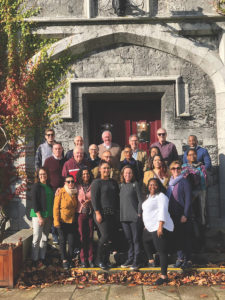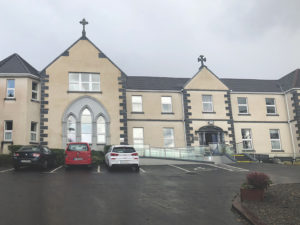EASTHAM — What would we do differently if we saw affordable housing as a human right? That’s the key question Andrea Aldana, director of housing advocacy for the Community Development Partnership (CDP) in Eastham, brought back from Ireland last week. She was there on an “affordable housing learning journey” with a delegation of housing advocates from across the state.
“In Ireland everyone agrees and understands that housing is a human right,” Aldana said, noting that people are not united on that view in the U.S.
The eight-day trip in October was organized by the Mass. Association of Community Development Corporations (MACDC), NeighborWorks Housing Solutions, and the Mass. Housing Partnership in partnership with the Irish Council for Social Housing. The Kuehn Foundation helped fund the trip for younger housing professionals like Aldana, who was the only representative of Cape Cod among 20 participants. The group included leaders of community development corporations, state housing agency officials, architects, private developers, and elected officials, according to a press release from the CDP.

The experience started, Aldana said, at the Irish Council for Social Housing Conference in Wexford. There, almost all of the keynote sessions had an environmental sustainability component.
“This was a surreal experience for me,” Aldana said, “to be in a country where not only does everyone acknowledge that climate change exists but everyone is actively pursuing solutions. If this had been in the U.S., you would have sworn it was a climate change summit.”
Massachusetts and Ireland are similar in size. The population of Massachusetts was 6.9 million in 2018, according to the U.S. Census. That compared to 4.9 million in Ireland, according to Eurostat.
In Ireland, affordable housing is referred to as “social housing.” Aldana said the Irish Council for Social Housing is roughly comparable to the MACDC.
“It was interesting to compare their approach to resource allocation compared to us given that the population is kind of comparable,” Aldana said.
Social housing is considered housing for life, which, Aldana said, has shaped the trajectory of development. The Irish government provides rental assistance to those who qualify for social housing by making up the difference between the affordable rent cost and the market rent cost for any given unit. As a person makes more money, the rental assistance can go down but that person isn’t required to leave and they could end up paying the market rent.
“That’s so incredibly important for the stability of people’s lives, and neighborhoods, and communities,” she said.
As the delegation traveled to cities including Galway, Dublin, and Belfast to tour developments, the social housing Aldana saw, she said, was visually appealing and well maintained.
That’s because the field has moved away from a focus on poverty to a mixed-income approach, Aldana said.
“When you think about affordable housing, you think about families who are struggling for a lot of reasons,” Aldana said. “It’s just a completely different sense when you walk into a development in Ireland. Yes, they’re serving people within really broad income ranges, low income, moderate income. But it looks like any other place.”
The concept works when the supply is consistent with the demand of low-income residents.

And Aldana learned that, in spite of the fact that Irish people value housing as a human right and resources are allocated accordingly, meeting the demand of people in need of social housing isn’t going as quickly as the country would like. NIMBY, it turns out, happens in Ireland, too.
Other activities on the trip included a lecture by Padraic Kenna, who, Aldana said, wrote the book on Irish social housing policy, and a meeting with Rory Guinness, a member of the famous stout-making family, which has always supported housing for their employees. She also observed that Ireland does a great job of repurposing old buildings for housing which, in some cases, could translate to the Cape.
Aldana told the Independent she got a boost from the experience. She came back, she said, ready to make change happen.
“I feel way more inspired to hold my ground and support people in being bigger and bolder in the way that they talk about housing,” she said, “even if it might make people a bit uncomfortable.”



